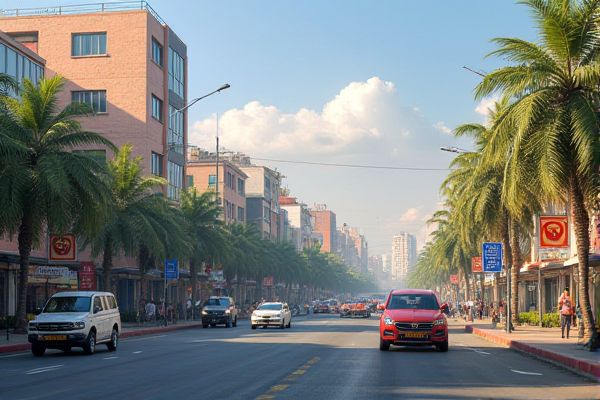
Local laws and regulations in India: India has a federal government system. Each state has distinct laws. Personal laws vary with religion. English and Hindi are official languages. Traffic laws are strictly enforced. Public smoking is prohibited. Taxation includes GST and income tax. Respect copyright and intellectual property laws. Adhere to visa and immigration rules. Alcohol laws differ by state.
India has a federal government system.
In India's federal government system, local laws and regulations are managed through three spheres of government: Union, State, and Local. The 73rd and 74th constitutional amendments recognize and protect local governments, with urban localities governed by municipalities and rural areas by the Panchayati Raj System, both deriving powers from state governments.
Each state has distinct laws.
Each state in India has distinct laws, with state legislatures making laws on subjects such as agriculture, health, education, and law and order, as outlined in the State List and Concurrent List of the Seventh Schedule to the Constitution. States also have the power to enact their own labor laws, such as the Shops and Establishments Act, which can vary significantly from state to state.
Personal laws vary with religion.
In India, personal laws vary by religion, governing aspects like marriage, divorce, inheritance, and adoption. For instance, laws such as the Hindu Marriage Act apply to Hindus, Buddhists, Jains, and Sikhs. Meanwhile, the Special Marriage Act provides a secular alternative for interfaith marriages and those not wishing to follow their respective personal laws. This creates a balance between religious beliefs and the desire for uniformity in legal proceedings.
English and Hindi are official languages.
In India, Hindi and English are recognized as the official languages at the national level. Despite Hindi being designated as the primary official language, English continues to be used for official purposes, including parliamentary sessions and legal proceedings, due to the Official Languages Act of 1963 which allows for the continued use of English alongside Hindi. For a deeper understanding of this linguistic diversity, the Languages Spoken in India can provide valuable insights into how these languages function within the multifaceted Indian society.
Traffic laws are strictly enforced.
In India, strict enforcement of traffic laws is seen as a crucial measure to promote discipline, respect for laws, and social cooperation, with initiatives like CCTV cameras and consistent policing aimed at reducing accidents and fostering a culture of compliance. For a detailed discussion on the importance of such enforcement, visit the Strict Enforcement Of Traffic Rules page. Such efforts not only enhance public safety but also encourage citizens to adhere to established guidelines, thereby creating a more orderly and respectful society.
Public smoking is prohibited.
Public smoking in India is prohibited in various public places, including auditoriums, cinemas, hospitals, public transport, restaurants, hotels, bars, pubs, amusement centers, offices, libraries, courts, and educational institutions, under the Prohibition of Smoking in Public Places Rules, 2008 and the Cigarettes and Other Tobacco Products Act (COTPA) 2003. Designated smoking areas are allowed in some enclosed workplaces like airports, hotels, and restaurants, but strict penalties, including fines, are imposed for violations. For more detailed information, you can explore the regulations on Smoking in India on the official website.
Taxation includes GST and income tax.
In India, taxation is governed by both the Central and State governments. For income tax, the Income Tax Department, under the Ministry of Finance, manages direct taxes with various slabs and rates, including the new and old tax regimes. The Goods and Services Tax (GST), introduced in 2017, is a comprehensive, multi-stage, destination-based indirect tax levied on the supply of goods and services, divided into several tax slabs and administered by both Central and State governments.
Respect copyright and intellectual property laws.
In India, the Copyright Act 1957 governs copyright law, safeguarding original literary, dramatic, musical, and artistic works for 60 years after the author's death. The law recognizes joint authorship and employer ownership in certain cases. It also provides remedies against infringement, which include administrative, civil, and criminal actions. For more detailed information about the intricacies of these protections and regulations, one can refer to the comprehensive resource available on Copyright Law of India.
Adhere to visa and immigration rules.
To adhere to visa and immigration rules in India, U.S. citizens must obtain a valid Indian visa or e-Visa, register with the Foreigners Regional Registration Office (FRRO) if staying more than 180 days, and ensure their visa type, validity, and number of entries match their travel plans. For comprehensive guidelines and updates, visitors can refer to the International Travel Country Information Page. Failure to comply can result in fines, penalties, and potential detention or deportation.
Alcohol laws differ by state.
In India, alcohol laws vary significantly by state, with some states like Bihar, Gujarat, Mizoram, Nagaland, and the union territory of Lakshadweep enforcing a complete ban on alcohol consumption, while others set different legal drinking ages ranging from 18 to 25 years, reflecting diverse cultural, social, and health considerations. For more information on specific regulations and their implications, you can visit the website on Dry States in India for comprehensive details.
